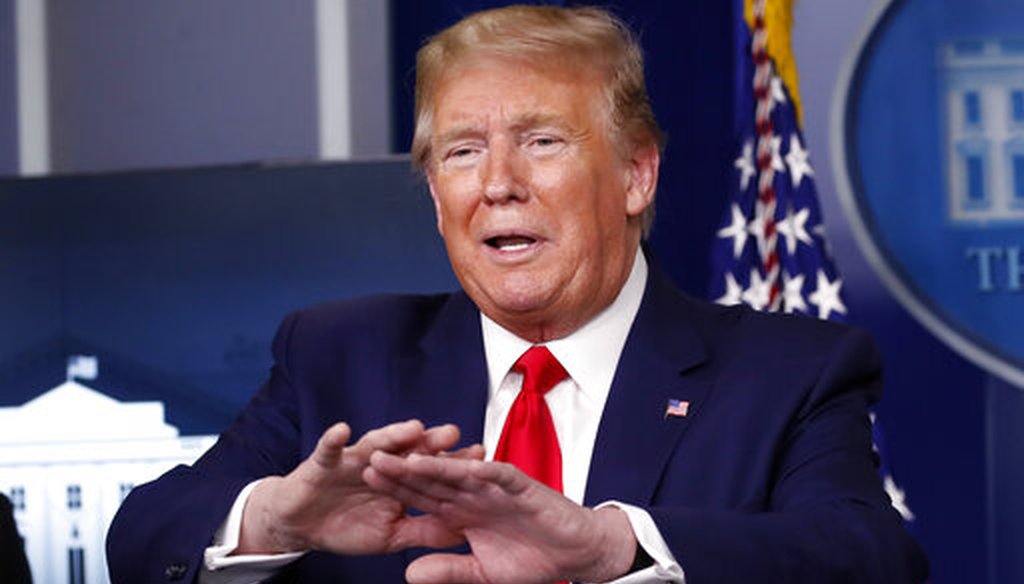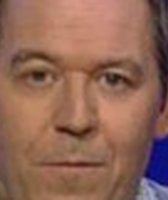Stand up for the facts!
Our only agenda is to publish the truth so you can be an informed participant in democracy.
We need your help.
I would like to contribute

President Donald Trump speaks about the coronavirus at the White House on April 20, 2020, in Washington. (AP/Brandon)
If Your Time is short
-
Trump’s decision to halt U.S. funding for the World Health Organization has renewed discussion about the Impoundment Control Act, which limits the president’s ability to control federal spending and played a role in Trump’s impeachment.
-
Experts said Trump likely has some wiggle room to redirect funding away from the WHO without running afoul of the act.
-
House Democrats previously argued that Trump violated the act when the White House withheld critical security assistance from Ukraine for policy reasons.
President Donald Trump’s recent pledge to halt U.S. funding for the World Health Organization in the midst of a pandemic has set off some of his critics, who say doing so is illegal.
House Speaker Nancy Pelosi, D-Calif., said in a statement that Trump’s decision is "dangerous, illegal and will be swiftly challenged."
Others drew a more direct link to the abuse-of-power charges that led to Trump’s impeachment.
"Trump's withholding of $ for World Health Organization is illegal," said MSNBC host Lawrence O’Donnell in an April 15 tweet. "It's exactly what he got impeached for."
Sign up for PolitiFact texts
Trump's withholding of $ for World Health Organization is illegal.
— Lawrence O'Donnell (@Lawrence) April 15, 2020
It's exactly what he got impeached for.
The House impeached Trump in December after a whistleblower’s complaint and months of testimony revealed his efforts to get Ukraine to announce investigations into his political rivals.
The president pressured Ukraine in part by holding up U.S. security assistance. House Democrats argued that the aid freeze was a violation of the Impoundment Control Act, a 1974 law that limits the president’s ability to control federal spending.
The nonpartisan Government Accountability Office concluded in January that the White House broke the law by withholding that aid from Ukraine "for a policy reason, which is not permitted."
Now, O’Donnell and others say Trump will run afoul of the same law if he follows through with his promise to withdraw funding earmarked for the WHO.
But it’s hard to say for sure. It depends what ultimately happens to the money. Trump said the funding would be paused for 60 to 90 days while the White House reviews the WHO’s handling of the coronavirus outbreak.
RELATED: Fact-checking Trump’s criticism of the WHO
What’s the Impoundment Control Act?
Before 1974, presidents sometimes impounded — or refused to spend — congressionally appropriated funds. But when President Richard Nixon was in office, Congress worried that Nixon was withholding funds to gut programs he didn’t like.
In response, Congress passed the Congressional Budget and Impoundment Control Act of 1974, which created the House and Senate budget committees, established the nonpartisan Congressional Budget Office, and limited the president’s ability to control federal spending.
A president who wants to rescind or freeze congressionally appropriated funds must send Congress a "special message" detailing the money involved and the reasons for withholding it.
If the president is asking to permanently rescind money, Congress must give its approval within 45 days, or else the money needs to be made available for spending.
If the president is asking to temporarily delay spending, then congressional approval is not required. But the president still has to notify Congress with a "special message." There are other requirements, too, including that spending can’t be stalled through the end of the fiscal year.
RELATED: Did Trump’s freeze on Ukraine aid violate the Impoundment Control Act?
How does the U.S. help finance the WHO?
The WHO takes in money from the U.S. in two forms. For starters, the U.S. pays assessment funds — or membership dues — which are spent as the WHO sees fit. On top of that, the U.S. also provides voluntary contributions to address specific health challenges.
The U.S. is the largest single donor to the WHO, which maintains a relatively small budget set at roughly $4.8 billion for 2020 and 2021, plus an extra $1 billion allocated for emergencies. Voluntary contributions make up the bulk of the WHO’s budget.
The U.S. pays about 22% of total assessed fees, according to the WHO. For 2020, the U.S.’s assessed contribution amounts to roughly $116 million, of which the country has already paid half, according to the WHO’s March 31 statement of account. The State Department estimated that the U.S. would have spent $122.7 million for the 2020 fiscal year if not for the halt.
The Trump administration told PolitiFact the second tranche of funds would typically be disbursed in September. Now, the 60-to-90-day review will determine what happens with it.
Is Trump on safe legal ground?
Trump might have some leeway to divert the WHO’s funding because Congress approved the money within a general pool of funds for international organizations, not the WHO specifically.
The Trump administration cited broad language related to "contributions to international organizations" in the fiscal 2020 appropriations law, which dedicated $1.47 billion "for necessary expenses, not otherwise provided for, to meet annual obligations of membership in international multilateral organizations." That money isn’t explicitly earmarked for the WHO.
Essentially, the White House is arguing that the broad language means the money is like "a discretionary slush fund," said Kimberly Wehle, professor of law at the University of Baltimore.
Trump could still run afoul of the Impoundment Control Act, depending on how the White House handles the remaining assessed fees that would otherwise go to the WHO.
Georgetown Law’s Timothy Westmoreland, an expert in health law and federal budgets, said he believes withholding the WHO’s funds is "bad health policy." But the key for impoundment-law purposes is whether Trump ultimately spends the money as appropriated.
"If President Trump were to try to keep the funds in the Treasury and not use them at all, that would be an illegal impoundment," Westmoreland said. "If the statute just says ‘funds for multilateral organizations,’ he could move WHO funds to another multilateral organization."
Trump doesn’t have "the authority to unilaterally withhold the funds indefinitely," Wehle added, noting that certain moves could require congressional notice or approval.
But if the money gets redirected in accordance with the language of the appropriations bill, Trump would likely be clear of any Impoundment Control Act problems, experts told us.
"If there was any flexibility or vagueness in the law, Trump may be legally entitled to shift spending within some broad category," said James Pfiffner, professor of public policy at George Mason University.
Another legal question is whether the U.S. is required to pay its entire assessed contribution in order to meet its "annual obligations of membership" in the WHO. Experts said this and other provisions in the appropriations bill could limit Trump’s ability to reprogram funds away from the WHO, even if the Impoundment Control Act never comes into play.
In the United Nations system, of which the WHO is a part, a country’s "assessed contributions are required dues," meaning payments are a legal obligation once a country becomes a member, according to the nonpartisan Congressional Research Service.
The WHO’s constitution says member countries that fail to meet their "financial obligations" risk losing voting privileges and services from the agency. A number of countries, including the U.S., still owe assessments from previous budget cycles.
The 60-to-90 day investigation Trump announced should determine what comes next. Trump said the U.S. "will continue to engage with the WHO to see if it can make meaningful reforms."
The WHO’s director general has said the organization is assessing the impact of the loss in funding and looking for ways to fill the funding gaps while working to combat the coronavirus.
Our Sources
Lawrence O’Donnell on Twitter, April 15, 2020
The World Health Organization, "Assessed contributions," accessed April 20, 2020
The World Health Organization, "Assessed contributions payable by Member States and Associate Members 2020-2021," accessed April 20, 2020
The World Health Organization, "Programme budget 2020 –2021," accessed April 20, 2020
The Washington Post, "Trump wants to review the WHO’s actions. These are its key roles and limitations." April 16, 2020
Politico, "Trump halt to WHO funding violates same law as Ukraine aid freeze, House Democrats say," April 15, 2020
CNBC, "Trump’s WHO funding threat echoes action that got him impeached, Democrats say," April 15, 2020
Roll Call, "Trump’s World Health Organization funding cutoff: It’s complicated," April 15, 2020
The Washington Post, "Congressional Democrats allege Trump’s move to defund World Health Organization is illegal," April 15, 2020
Nancy Pelosi, Speaker of the House, "Pelosi Statement on President Trump Halting WHO Funding," April 15, 2020
NPR, "Trump And WHO: How Much Does The U.S. Give? What's The Impact Of A Halt In Funding?" April 15, 2020
CNN, "WHO says it regrets Trump's decision to halt funding, but remains focused on coronavirus response," April 15, 2020
The White House, "Remarks by President Trump in Press Briefing," April 14, 2020
The World Health Organization, "Assessed contributions overview for all Member States," March 31, 2020
The Congressional Research Service, "United Nations Issues: U.S. Funding to the U.N. System," March 10, 2020
Department of State, "Congressional Budget Justification Department of State, Foreign Operations, and Related Programs, Fiscal Year 2021," Feb. 10, 2020
Government Accountability Office, "Office of Management and Budget—Withholding of Ukraine Security Assistance," Jan. 16, 2020
The World Health Organization, "Programme budget 2020–2021," May 24, 2019
Congress.gov, "H.R.1865 - Further Consolidated Appropriations Act, 2020," Jan. 3, 2019
The World Health Organization, "Basic Documents," Dec. 31, 2014
PolitiFact, "Did Trump’s freeze on Ukraine aid violate the Impoundment Control Act?" Dec. 5, 2019
Email interview with Kimberly Wehle, professor of law at the University of Baltimore, April 19, 2020
Email interview with Timothy Westmoreland, professor at Georgetown Law, April 18, 2020
Email interview with James Pfiffner, professor of public policy at the Schar School at George Mason University, April 16, 2020
Statement from the Trump administration, April 17, 2020






























